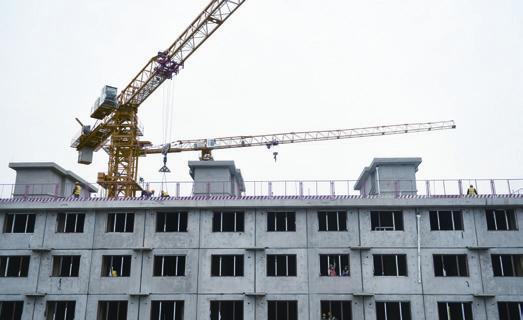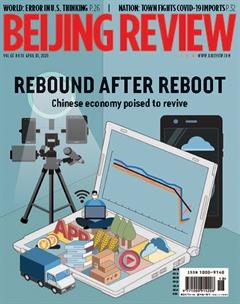Spring Revival
By Zhang Shasha
Popular celebrity live-streamer Weiya has launched and sold many products on tech giant Alibabas e-commerce platform Taobao, from cosmetics to books and even rockets. On April 2, she expanded her range further when she sold real estate online.
In collaboration with a real estate agent in Hangzhou, Zhejiang Province in east China, she sold vouchers to viewers, which would enable them to buy apartments from the agent at a discount if the purchase was made within 30 days. In case they didnt buy anything, they would get their money back.
Online campaigns
With live-streaming marketing in full swing across China, this has also become a creative way of selling houses, especially with peoples movements still restricted to prevent a rebound in novel coronavirus infections. Zhang Hongwei, Research Director of Tospur, a real estate research organization, however, pointed out that live-streaming properties for sale is more a method to promote the brand image, the actual transaction is secondary.

Apart from roping in celebrities, real estate agents themselves are also doing online sales, demonstrating their housing resources with virtual reality. Since Evergrande, one of Chinas biggest real estate companies, announced on February 13 that it was starting an online promotion to sell houses, it has seen a remarkable performance in the first quarter. Its sales hit 147.4 billion yuan ($20.8 billion), increasing 23.2 percent year on year.
At Evergrandes 2019 annual performance meeting held in March, Xu Jiayin, Chairman of the company, said they witnessed the best first quarter results in the companys history, with the sales crossing 600 billion yuan ($84.8 billion).
It shows business is picking up for the sector after a slump in the beginning of the year. Zhang Dawei, chief analyst of Centaline Property, a Hong Kong-based property agency that is one of the biggest in the special administrative region, attributes the decline to two reasons: There was the double impact of the Spring Festival, when most real estate activities were closed for a full month in February, and then came the epidemic, im-pacting the market greatly in the short term as some cities saw zero transaction.
However, in March, most agencies reopened their sales office, construction has gradually started from south to north, and real estate investment has begun to recover, Zhang added.
According to the National Bureau of Statistics, investment in real estate development declined by 7.7 percent in the first quarter. The total value of commercial buildings sold was over 2 trillion yuan ($287.8 billion), down by 24.7 percent. However, in March the decline narrowed by 11.2 percentage points compared to that in the fi rst two months.
Michael Zhang, director of office leasing at Jones Lang LaSalle (JLL) Beijing, a U.S. commercial real estate agency, said with the huge financial costs of the novel coronavirus epidemic putting further strain on the market, they anticipate both the volume of leasing transactions and rents will see downward pressure in the following quarters. “However, we are still seeing cases of far-sighted tenants making full use of the low-rent opportunities to increase their offi ce areas, upgrade facilities and move their offices to buildings with better property management services,” he added.
Michael Wang, the agencys head of capital markets for North China, also remained optimistic. “Domestic investors are still involved in active purchasing activities while foreign investors see it as a hard-won window period for investment,” he said.
His optimism was borne out with GIC Private Ltd., the Singapore-based sovereign wealth fund, snapping up electronics multinational LG Groups LG Twin Tower on Changan Avenue, one of Beijings arterial streets close to Tiananmen Square, for 8 billion yuan ($1.13 billion) in February. Lee Kok Sun, Chief Investment Officer of GIC, said in a statement that China is still a major investment market for them, and the move refl ected they are still committed to seeking attractive investment opportunities in the country.
Housing policy unchanged
On April 20, Chinas central bank lowered its one-year loan prime rate (LPR), the interest rate for customers with good credit, to 3.85 percent, 20 basis points lower than the previous 4.05 percent. The five-year-plus LPR was reduced to 4.65 percent, 10 basis points lower than the previous 4.75 percent.
“The move will signifi cantly cut the rate of corporate loans, which will give strong support to small and medium-sized companies in the battle against the epidemic,”Dong Ximiao, a researcher with the National Institution for Finance and Development, a think tank in Beijing, said.


